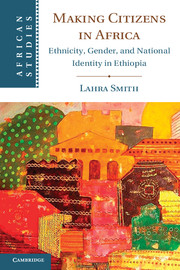Book contents
- Frontmatter
- Contents
- Maps and Tables
- Acknowledgments
- Abbreviations
- Glossary
- Maps
- Introduction
- The Challenge
- The Response
- Appendix I Methodology
- Appendix II Questionnaire for Parents and Community Members (English)
- Appendix III Questionnaire for School Directors
- Appendix IV Questionnaire for Teachers
- Bibliography
- Index
Appendix I - Methodology
Published online by Cambridge University Press: 05 May 2013
- Frontmatter
- Contents
- Maps and Tables
- Acknowledgments
- Abbreviations
- Glossary
- Maps
- Introduction
- The Challenge
- The Response
- Appendix I Methodology
- Appendix II Questionnaire for Parents and Community Members (English)
- Appendix III Questionnaire for School Directors
- Appendix IV Questionnaire for Teachers
- Bibliography
- Index
Summary
I conducted research in Ethiopia over the course of several years. My interest in the country began while I was living in Ethiopia’s southern neighbor, Kenya. While living in Kenya in 1997–1998, during that country’s second multiparty election, I observed the types of violence surrounding particularly electoral politics, as well as the tremendous conversation about ethnicity that happened, both on the national stage but also over tea or dinner, in office relationships, and neighborhood life. I was intrigued by the possibility of institutional solutions to the negative consequences of the entrenchment and politicization of ethnic identities. Although Kenya itself is such a complex and fascinating place to think about these questions, work-related travel to Ethiopia suggested to me that federalism was an important and innovative experiment that was actually much more relevant to the types of questions I had. Returning to the United States for my graduate work, I turned from Kiswahili to Amharic, from unitary and nationalist rhetoric to decentralizing and ethnonationalist discourse, from Kenya to Ethiopia. Early travel in 1998 and 2001 helped me frame questions and methods for my fieldwork, which was conducted from January to December 2003.
Once in Ethiopia, I focused on language policy. Because I was interested primarily in federalism and ethnic identity, language policy provided a discrete and slightly less politically charged way to go about analyzing the elements of decentralization proposed and underway and, particularly, to begin to collect perspectives on identity politics. The first six months was mainly concentrated on elite interviews – intellectuals, politicians, government officials, international representatives, and civil society activists and practitioners. This was accomplished through snowball sampling. These were done one on one, by me, and in English.
- Type
- Chapter
- Information
- Making Citizens in AfricaEthnicity, Gender, and National Identity in Ethiopia, pp. 205 - 209Publisher: Cambridge University PressPrint publication year: 2013

